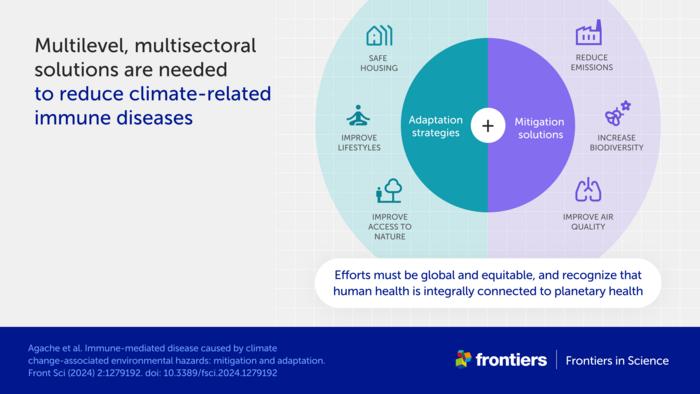Climate change, pollution, and declining biodiversity are wreaking havoc on our immune systems, leading to a dramatic increase in diseases like asthma and cancer, according to a new study by a global team of researchers. The study, published in Frontiers in Science, calls for urgent action to protect our health and the health of our planet.
“Increased emission of pollutants has led to fundamental changes in our environment,” said lead author Prof Ioana Agache of the Transilvania University of Brasov, Romania. “From an evolutionary perspective, the immune system is constantly molded to respond to the environment and maintain health; however, the recent changes have been too rapid for our immune system to adequately adapt.”
The researchers explain that our immune systems develop over time in response to environmental factors, both positive and negative. However, the rapid changes caused by human activity, such as climate change and pollution, are damaging the very systems that keep us healthy.
Exposure to toxic pollutants damages the body’s natural defenses, leading to immune disorders and cancer. At the same time, a lack of exposure to healthy biodiversity means that our immune systems are not properly calibrated, driving up rates of allergies and asthma.
Climate change is also increasing the frequency and severity of natural disasters, such as wildfires, which release harmful pollutants into the air. These pollutants can spread for hundreds of miles and linger long after the fire is out, contributing to immune problems and worsening a range of health issues.
“As a physician-scientist, I have seen first-hand how air pollution from wildfires affect respiratory health,” said Prof Kari Nadeau of Harvard University, senior author. “I have also seen the impact of lengthening pollen season and increased pollen allergenicity on allergies and asthma.”
The impacts of these changes fall most heavily on the most vulnerable members of society. Poor diet, lack of access to nature, and inadequate housing all increase the risk of developing immune-mediated diseases. The researchers stress that measures to fight the health impacts of climate change must explicitly include equity, to ensure a global recovery from a global threat.
To address these issues, the scientists call for a two-pronged approach: adapt to climate change by improving diets, housing, access to nature, and agricultural practices, and mitigate its impact by cutting emissions, improving air quality, and fostering environmental biodiversity.
To take effective action, however, we need data to inform new measures and track the progress of existing ones. The researchers highlight three key data initiatives: biomarkers to track immune-mediated diseases caused by air pollution, economic models to quantify the harm done by climate change and the cost benefits of remedial action, and data science techniques to unravel the complex influences of our altered environment on our immune systems.
“The impacts of climate change are complex, with multifaceted effects,” said Dr Vanitha Sampath of Harvard University, author. “AI can assist with the convergence and analysis of disparate datasets to identify threats and inform remediation.”
The researchers estimate that every dollar spent on climate change mitigation saves three dollars on healthcare costs. By taking action to protect our planet, we can also protect our health and the health of future generations.
“It is clear that planetary health and human health are interconnected,” concluded Nadeau. “I hope by sharing current knowledge on how our actions adversely affect planetary and human health, and some of the actions we can take to adapt to and mitigate these changes, we can empower individual citizens as well as local, national, and international organizations to work towards a better future.”
The study is part of a larger effort by scientists to raise awareness about the links between climate change and human health, and to inspire action to address these pressing issues. With the right measures in place, we can safeguard our health and the health of our planet for generations to come.

